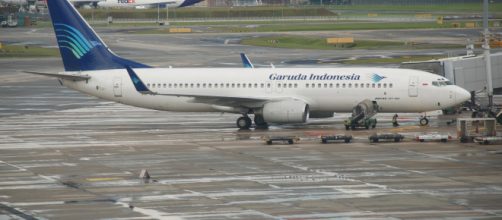An Indonesia-based international airline just became the very first airline company in the world that wants to cancel its orders for Boeing's Max aircraft. Such an unexpected cancellation of orders comes as a result of the two deadly crashes that took place in Ethiopia and Indonesia within a span of barely five months. This cancellation carries a risk of costing Boeing billions of dollars in losses, Gizmodo reported.
Risks of Boeing's planes
The Indonesian airline Garuda has reportedly contacted Boeing for the purpose of canceling its deal with the company for its Max planes.
The deal that was supposed to happen between the two companies was worth somewhere around $4.9 billion. The deal included the purchase of 49 Boeing's 737 Max 8 planes. However, two deadly crashes happened recently which involved the 737 planes. Garuda's customers started raising several concerns related to the aircraft which is a huge reason why the company canceled its deal with Boeing, according to a report by the Associated Press. At the beginning of 2014, Garuda initially ordered 50 planes from Boeing but received the delivery of only one plane in 2017.
Garuda recently released an official statement saying that its customers are constantly asking the airline staff regarding which aircraft they will be flying on due to the recent crashes that have taken place.
The company also said its customers have lost their entire faith and belief in the brand new Boeing 737 Max planes. Fortunately for Boeing, its deal with Garuda airline might not be dead after all.
Wall Street reports that it's quite a difficult task for airlines to change planes from entirely different manufacturers as pilots are trained for an extensive period of time on the specific plane that they will be flying. So now, if Garuda's pilots are familiar with the Boeing planes, it will be easy for the company to transition to a different Boeing aircraft.
According to NBC News, the Indonesian airline sent a letter to Boeing in regards to the cancelation of its orders on March 14. The sending of the letter comes just four days after the latest crash in the country of Ethiopia on March 10 that killed all 157 passengers on board.
The first crash that happened involving a Max 8 was on October 29, 2018. This was near the coast of Indonesia and killed around 189 people.
Boeing 737 Max crashes
The authorities are still investigating the cause of the latest plane crash. However, the earliest reports suggest that both planes may have given a false indication of the nose being pointed way too high. The automation system in the plane called the Maneuvering Characteristics Augmentation System must have forced the aircraft's nose down to make sure that it didn't stall.
Presently, it's not clear if the pilots had the ability to counteract or even override the automated system. Boeing issued an official statement recently saying that it is going to release a software update for the controversial Max planes by the end of April.
Just recently, it was revealed that Boeing charges airline companies extra money for high-level safety features. These features include warning the pilot in case of a false reading in the automation system.
As of now, about 385 Boeing Max planes are in the hands of airlines around the globe. But keeping the safety measures in consideration, every single one of those planes have been grounded until the authorities have completed their investigation. Orders for more than 4,000 planes have been placed by airlines but not yet delivered. It's pretty much expected for Boeing to see a lot more dissatisfied customers in the coming weeks over safety concerns.
Garuda's top representatives have reportedly set up a meeting with the Boeing's senior executives next week in the Indonesian capital, Jakarta to talk about their ongoing deal.
It's not entirely clear if Boeing will accept the cancelation at such short notice. There is also a possibility that the agreement between the two companies might force them to accept a different arrangement. Generally, a usual down-payment on an aircraft is around five percent. Before two years of the aircraft's final delivery, the airlines begins the process of progress payments, the Wall Street Journal reported.


